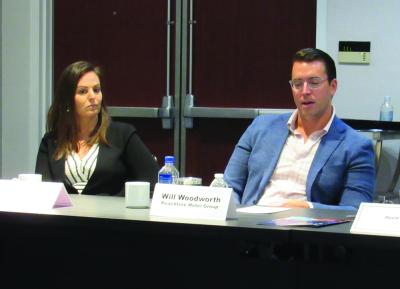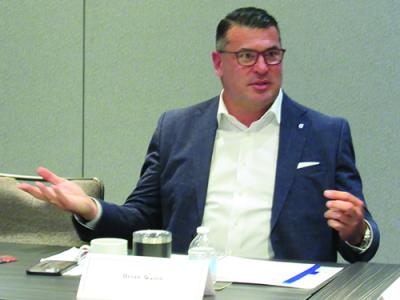During the NYU International Hospitality Industry Investment Conference, Hotel Management hosted a roundtable discussion sponsored by Sonesta International Hotels Corp. that focused on many elements, including global hotel development.
The global economy is still under pressure as inflation pushes on and central banks act to tamp it down by raising interest rates. Despite it all, the global hospitality industry remains resilient in the face of a host of headwinds, from COVID-19 to labor.
Those subjects and their direct impact on global hotel development served as the backdrop for a roundtable gathering of hospitality executives during the NYU International Hospitality Industry Investment Conference in New York.
All in all, confidence, even opportunity, in the sector was the prevailing sentiment. “The silver lining here is that the industry has become more resourceful, efficient and savvier and that accelerated through COVID,” said Andrea Grigg, senior managing director and head of global asset management at JLL. One trend she and others observed is that asset types are being blurred. As leisure travel boomed, traditional business hotels found a new revenue stream in leisure guests.
From a development aspect, Allison Callen of Global Holdings Management Group believes there could be a paradigm shift in the way hotels are designed going forward. No longer will hotels just be deemed a “business hotel,” but cater to all facets of travel as the “bleisure” trend becomes less than a fad and more a constant with the rise of universal remote working. “There will certainly be [more of a] leisure aspect into what previously would have been just a strictly business hotel,” she said.

and Will Woodworth, VP of investments for Peachtree Hotel Group,
discuss debt for new projects. (Hotel Management)
Brian Quinn, chief development officer for Sonesta International Hotels Corp., maintains the same optimism for the industry as it navigates through the difficult macroeconomic climate. “After 9/11, when real estate crashed, we [sought] to learn a lesson,” he said. “Ultimately, it’s about humanity. People want to travel and with unemployment where it is, people feel pretty confident.”
In some ways, the hotel industry benefitted from the pandemic. “It wasn’t that people weren’t working, it’s that people were working at home and building up quite a bit of savings,” said Valerie McCormick, VP of development and retention at Aimbridge Hospitality.
Grigg is convinced that travel demand has longer legs as consumers pivot from goods to services. “People are back to wanting experiences—and we are seeing a return of multigenerational travel,” she said. It makes sense: Through the pandemic many grandparents, for example, were cut off from seeing their grandkids in person. “People want to get together,” Grigg added.
The Development Cycle
The pandemic put a hold on many new projects and, according to JLL, total hotel transactions in the first half of 2022 were up 2.4 percent versus the same period in 2021 and up 89.7 percent to 2019. More encouraging, total deals in H1 2022 hit 612, the highest H1 total on record, according to JLL’s “U.S. Hotel Investment Trends by the Numbers – H1 2022.” And consider Washington, D.C., a city that was laid barren in the wake of the pandemic. Its total transaction volume in H1 2022 hit $740 million, up 79 percent to 2019 and 75 percent to 2021.
Deciding whether to buy or build remains the principal question. “We got some dirt we may not do anything with for a while,” said Will Woodworth, VP of investments for Peachtree Hotel Group. “We do feel that new beats old.”
Dishing the dirt is now a real thing in hospitality. Woodworth said Peachtree would love to hold plots down for a while, but there is now even the option to sell the land at a multiple. “Our strategy used to be ‘build, build, build’ and get bigger. Now, each individual deal is different and while it may have felt like a great thing to build three to four years ago, now it’s turned into markets where we can wipe our hands clean of this thing.”
Peachtree has opened three hotels so far this year and is slated to break ground on five more. Woodworth said that for his company and others, midscale, extended-stay and premium select-service have been their “bread and butter.”
And as the extended-stay space continues to attract both developer and guest attention, according to Quinn, there is vast runway to grow the segment, especially outside the U.S., in regions such as Latin America. “It’s really not been adopted and we think this trend is real,” Quinn said.
Europe, however, could be a tougher proposition for extended-stay given the space requirements needed for guestrooms.
Migration patterns need to also be part of any developer’s or investor’s game plan, along with getting ahead of the trends to improve return on investment. “We should be all cognizant of it,” McCormick said. As work becomes more remote by nature, many people are leaving certain places and opting for others that may provide a better quality of life. “Always look for where the next Austin [Texas] is going to be,” she continued, which some on the roundtable expect is Tulsa, Okla.
New projects are still getting back on track but the lead time plus the costs can make it trickier than buying, depending on if you can still buy below replacement cost in a given market. “On the new construction side, you have to bake in the rising costs of it, on materials like steel and [general contractor] labor,” Quinn said. But he’s still confident in the building sector: “Deals are still getting through.”
Peachtree also is a lender and Woodworth said loan-to-cost is down. While it used to underwrite to 65 percent of gross development value, it’s now down to 55 percent. Some developers have turned to clean energy financing to fill gaps, he said.
A New Era of Design
New projects and renovations also now will need to fit within a post-COVID world, where norms have certainly changed—potentially for good. “The guests determine what we have to watch and we have to wait and see what those trends are and where they’re migrating to,” McCormick said.

despite the macroeconomic headwinds. (Hotel Management)
“It’s amazing to see how quickly it’s changed for COVID,” Quinn said. “Now, we have to have [multiple] workstations, even in meeting spaces. ... New construction will react to that, but existing hotels have to figure that out, too.”
Assets also are being built and designed to maximize square footage and generate revenue per each foot of space. That means going beyond the sale of rooms and looking at a total revenue picture. “Our hotel, Yours Truly, in downtown D.C., is one of those places that even if you’re not staying there, you want to go in and have a cocktail and check it out and take pictures,” McCormick said. “We have to make the hotels that attract out-of-town guests as much as those who live in the neighborhood.”
“Dirt is expensive and you have to maximize every opportunity,” Woodworth said.
“It’s also a lot about a new generation of people that want something unique, that want to take a picture,” said Callen.
The Realness of ESG
In an industry full of abbreviations, ESG—Environmental, Social and Governance—stands out and has become a rallying cry for all businesses that touch the hospitality industry. But does it have teeth? According to the roundtable, ESG is becoming interwoven in overall business plans, especially as ESG mandates become more prevalent.
“Ten years ago, we were all talking about it,” Grigg said. “Guests come to demand it. And governmental pressure is going to increase slowly, but surely. There are capital sources, especially in Europe, in which you can achieve a lower capital cost. We have done the work and the investments for a more sustainable model.”
“There are laws coming out that require X amount of carbon emissions,” added Callen. “It’s a big part and brands are pushing it, too.”
